Higher Education: A Report on Dyslexia Specialists and Support
VerifiedAdded on 2019/09/19
|7
|1985
|434
Report
AI Summary
This report examines the challenges faced by students with dyslexia in higher education, focusing on the need for specialized support. It begins by defining dyslexia and highlighting its prevalence. The report then delves into theoretical explanations, including the phonological deficit model and the visual processing disorder theory, exploring how these factors contribute to reading difficulties. It presents research on phonological awareness, rapid naming, and visual processing, discussing the impact of these aspects on reading abilities. Furthermore, the report provides solutions and intervention strategies, such as phonics-based instruction, rapid naming interventions, and various therapies. The conclusion emphasizes the importance of early recognition and support for students with dyslexia transitioning to higher education, underscoring the need for continuous support to navigate the demands of higher education. The author reflects on skills developed during the analysis, including analytical skills, teamwork, presentation abilities, and negotiation.
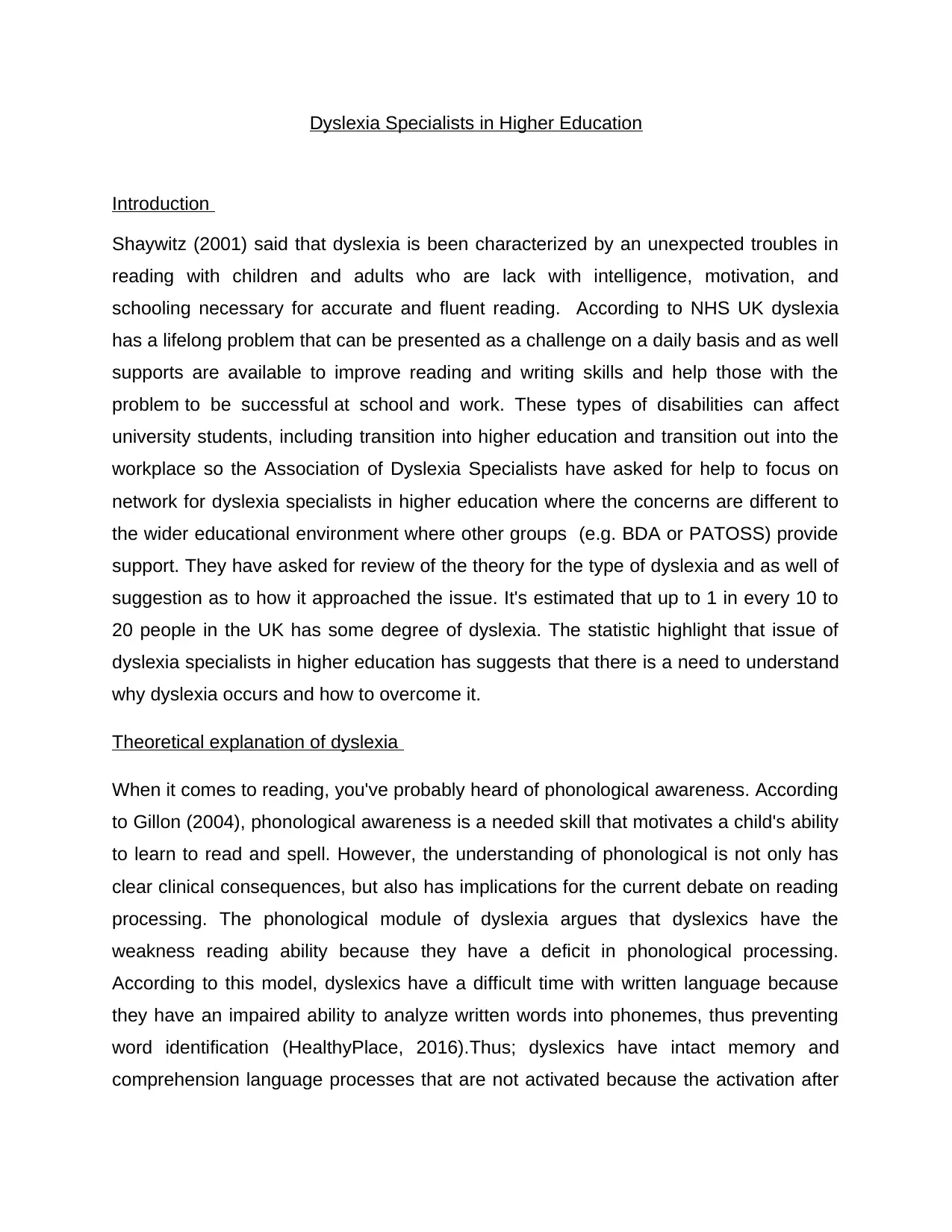
Dyslexia Specialists in Higher Education
Introduction
Shaywitz (2001) said that dyslexia is been characterized by an unexpected troubles in
reading with children and adults who are lack with intelligence, motivation, and
schooling necessary for accurate and fluent reading. According to NHS UK dyslexia
has a lifelong problem that can be presented as a challenge on a daily basis and as well
supports are available to improve reading and writing skills and help those with the
problem to be successful at school and work. These types of disabilities can affect
university students, including transition into higher education and transition out into the
workplace so the Association of Dyslexia Specialists have asked for help to focus on
network for dyslexia specialists in higher education where the concerns are different to
the wider educational environment where other groups (e.g. BDA or PATOSS) provide
support. They have asked for review of the theory for the type of dyslexia and as well of
suggestion as to how it approached the issue. It's estimated that up to 1 in every 10 to
20 people in the UK has some degree of dyslexia. The statistic highlight that issue of
dyslexia specialists in higher education has suggests that there is a need to understand
why dyslexia occurs and how to overcome it.
Theoretical explanation of dyslexia
When it comes to reading, you've probably heard of phonological awareness. According
to Gillon (2004), phonological awareness is a needed skill that motivates a child's ability
to learn to read and spell. However, the understanding of phonological is not only has
clear clinical consequences, but also has implications for the current debate on reading
processing. The phonological module of dyslexia argues that dyslexics have the
weakness reading ability because they have a deficit in phonological processing.
According to this model, dyslexics have a difficult time with written language because
they have an impaired ability to analyze written words into phonemes, thus preventing
word identification (HealthyPlace, 2016).Thus; dyslexics have intact memory and
comprehension language processes that are not activated because the activation after
Introduction
Shaywitz (2001) said that dyslexia is been characterized by an unexpected troubles in
reading with children and adults who are lack with intelligence, motivation, and
schooling necessary for accurate and fluent reading. According to NHS UK dyslexia
has a lifelong problem that can be presented as a challenge on a daily basis and as well
supports are available to improve reading and writing skills and help those with the
problem to be successful at school and work. These types of disabilities can affect
university students, including transition into higher education and transition out into the
workplace so the Association of Dyslexia Specialists have asked for help to focus on
network for dyslexia specialists in higher education where the concerns are different to
the wider educational environment where other groups (e.g. BDA or PATOSS) provide
support. They have asked for review of the theory for the type of dyslexia and as well of
suggestion as to how it approached the issue. It's estimated that up to 1 in every 10 to
20 people in the UK has some degree of dyslexia. The statistic highlight that issue of
dyslexia specialists in higher education has suggests that there is a need to understand
why dyslexia occurs and how to overcome it.
Theoretical explanation of dyslexia
When it comes to reading, you've probably heard of phonological awareness. According
to Gillon (2004), phonological awareness is a needed skill that motivates a child's ability
to learn to read and spell. However, the understanding of phonological is not only has
clear clinical consequences, but also has implications for the current debate on reading
processing. The phonological module of dyslexia argues that dyslexics have the
weakness reading ability because they have a deficit in phonological processing.
According to this model, dyslexics have a difficult time with written language because
they have an impaired ability to analyze written words into phonemes, thus preventing
word identification (HealthyPlace, 2016).Thus; dyslexics have intact memory and
comprehension language processes that are not activated because the activation after
Paraphrase This Document
Need a fresh take? Get an instant paraphrase of this document with our AI Paraphraser
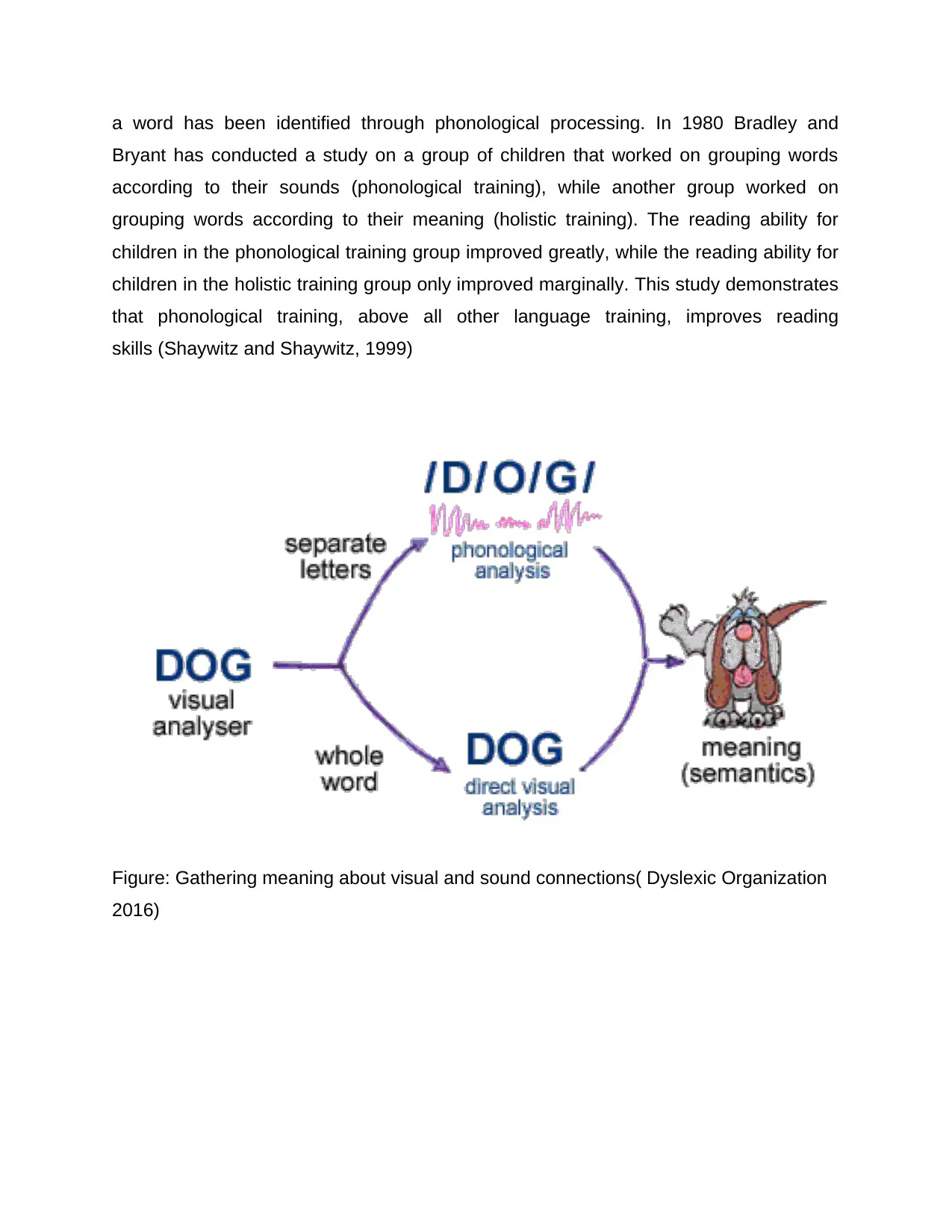
a word has been identified through phonological processing. In 1980 Bradley and
Bryant has conducted a study on a group of children that worked on grouping words
according to their sounds (phonological training), while another group worked on
grouping words according to their meaning (holistic training). The reading ability for
children in the phonological training group improved greatly, while the reading ability for
children in the holistic training group only improved marginally. This study demonstrates
that phonological training, above all other language training, improves reading
skills (Shaywitz and Shaywitz, 1999)
Figure: Gathering meaning about visual and sound connections( Dyslexic Organization
2016)
Bryant has conducted a study on a group of children that worked on grouping words
according to their sounds (phonological training), while another group worked on
grouping words according to their meaning (holistic training). The reading ability for
children in the phonological training group improved greatly, while the reading ability for
children in the holistic training group only improved marginally. This study demonstrates
that phonological training, above all other language training, improves reading
skills (Shaywitz and Shaywitz, 1999)
Figure: Gathering meaning about visual and sound connections( Dyslexic Organization
2016)
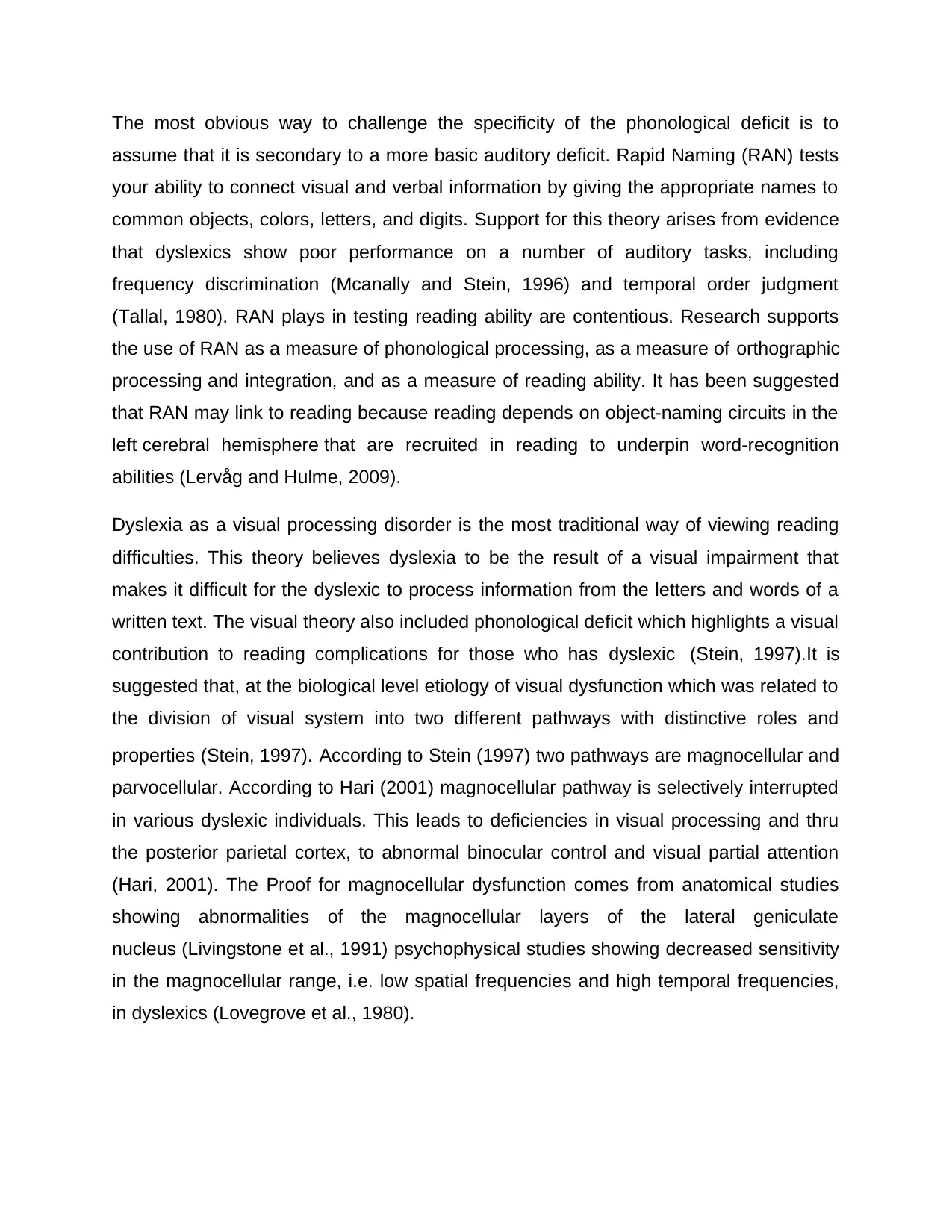
The most obvious way to challenge the specificity of the phonological deficit is to
assume that it is secondary to a more basic auditory deficit. Rapid Naming (RAN) tests
your ability to connect visual and verbal information by giving the appropriate names to
common objects, colors, letters, and digits. Support for this theory arises from evidence
that dyslexics show poor performance on a number of auditory tasks, including
frequency discrimination (Mcanally and Stein, 1996) and temporal order judgment
(Tallal, 1980). RAN plays in testing reading ability are contentious. Research supports
the use of RAN as a measure of phonological processing, as a measure of orthographic
processing and integration, and as a measure of reading ability. It has been suggested
that RAN may link to reading because reading depends on object-naming circuits in the
left cerebral hemisphere that are recruited in reading to underpin word-recognition
abilities (Lervåg and Hulme, 2009).
Dyslexia as a visual processing disorder is the most traditional way of viewing reading
difficulties. This theory believes dyslexia to be the result of a visual impairment that
makes it difficult for the dyslexic to process information from the letters and words of a
written text. The visual theory also included phonological deficit which highlights a visual
contribution to reading complications for those who has dyslexic (Stein, 1997).It is
suggested that, at the biological level etiology of visual dysfunction which was related to
the division of visual system into two different pathways with distinctive roles and
properties (Stein, 1997). According to Stein (1997) two pathways are magnocellular and
parvocellular. According to Hari (2001) magnocellular pathway is selectively interrupted
in various dyslexic individuals. This leads to deficiencies in visual processing and thru
the posterior parietal cortex, to abnormal binocular control and visual partial attention
(Hari, 2001). The Proof for magnocellular dysfunction comes from anatomical studies
showing abnormalities of the magnocellular layers of the lateral geniculate
nucleus (Livingstone et al., 1991) psychophysical studies showing decreased sensitivity
in the magnocellular range, i.e. low spatial frequencies and high temporal frequencies,
in dyslexics (Lovegrove et al., 1980).
assume that it is secondary to a more basic auditory deficit. Rapid Naming (RAN) tests
your ability to connect visual and verbal information by giving the appropriate names to
common objects, colors, letters, and digits. Support for this theory arises from evidence
that dyslexics show poor performance on a number of auditory tasks, including
frequency discrimination (Mcanally and Stein, 1996) and temporal order judgment
(Tallal, 1980). RAN plays in testing reading ability are contentious. Research supports
the use of RAN as a measure of phonological processing, as a measure of orthographic
processing and integration, and as a measure of reading ability. It has been suggested
that RAN may link to reading because reading depends on object-naming circuits in the
left cerebral hemisphere that are recruited in reading to underpin word-recognition
abilities (Lervåg and Hulme, 2009).
Dyslexia as a visual processing disorder is the most traditional way of viewing reading
difficulties. This theory believes dyslexia to be the result of a visual impairment that
makes it difficult for the dyslexic to process information from the letters and words of a
written text. The visual theory also included phonological deficit which highlights a visual
contribution to reading complications for those who has dyslexic (Stein, 1997).It is
suggested that, at the biological level etiology of visual dysfunction which was related to
the division of visual system into two different pathways with distinctive roles and
properties (Stein, 1997). According to Stein (1997) two pathways are magnocellular and
parvocellular. According to Hari (2001) magnocellular pathway is selectively interrupted
in various dyslexic individuals. This leads to deficiencies in visual processing and thru
the posterior parietal cortex, to abnormal binocular control and visual partial attention
(Hari, 2001). The Proof for magnocellular dysfunction comes from anatomical studies
showing abnormalities of the magnocellular layers of the lateral geniculate
nucleus (Livingstone et al., 1991) psychophysical studies showing decreased sensitivity
in the magnocellular range, i.e. low spatial frequencies and high temporal frequencies,
in dyslexics (Lovegrove et al., 1980).
⊘ This is a preview!⊘
Do you want full access?
Subscribe today to unlock all pages.

Trusted by 1+ million students worldwide
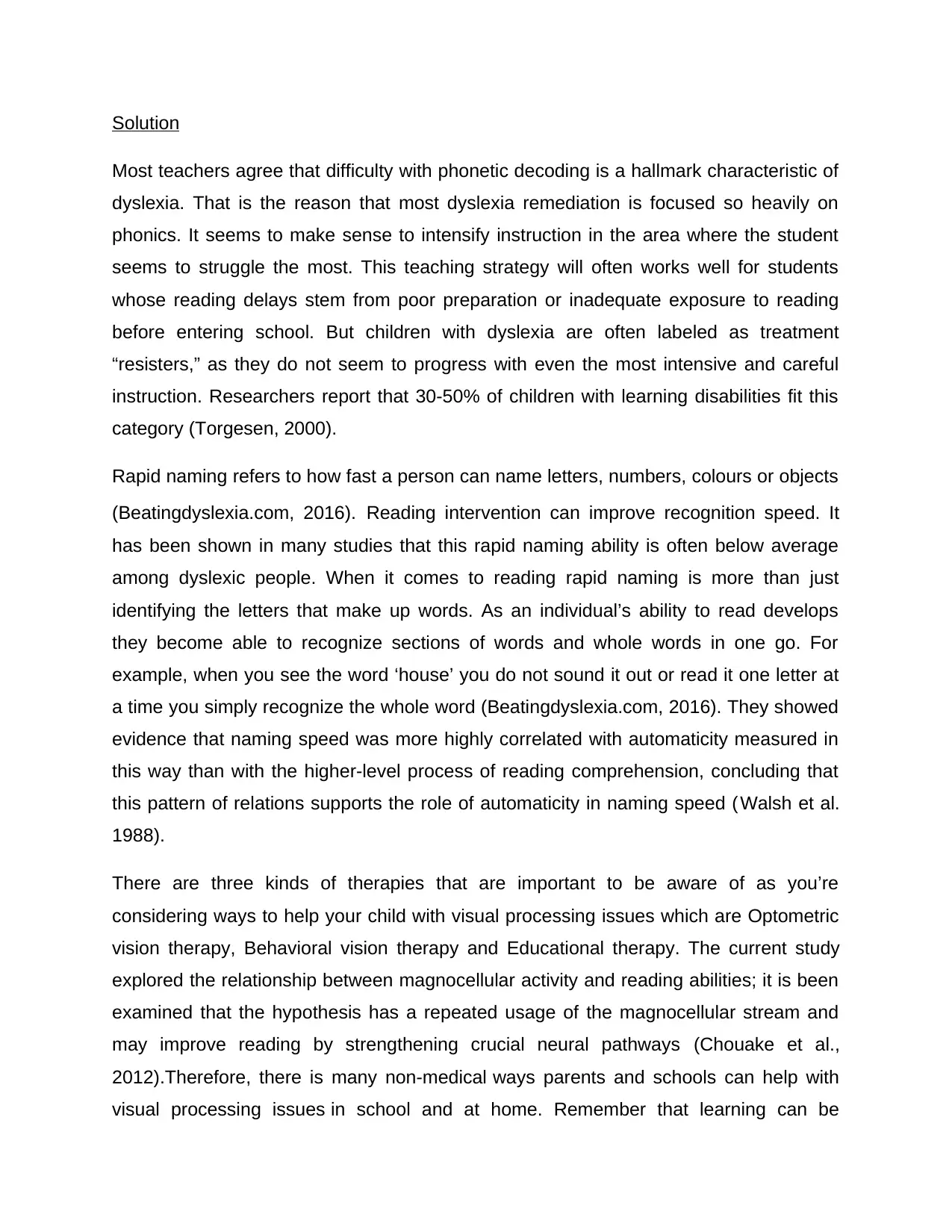
Solution
Most teachers agree that difficulty with phonetic decoding is a hallmark characteristic of
dyslexia. That is the reason that most dyslexia remediation is focused so heavily on
phonics. It seems to make sense to intensify instruction in the area where the student
seems to struggle the most. This teaching strategy will often works well for students
whose reading delays stem from poor preparation or inadequate exposure to reading
before entering school. But children with dyslexia are often labeled as treatment
“resisters,” as they do not seem to progress with even the most intensive and careful
instruction. Researchers report that 30-50% of children with learning disabilities fit this
category (Torgesen, 2000).
Rapid naming refers to how fast a person can name letters, numbers, colours or objects
(Beatingdyslexia.com, 2016). Reading intervention can improve recognition speed. It
has been shown in many studies that this rapid naming ability is often below average
among dyslexic people. When it comes to reading rapid naming is more than just
identifying the letters that make up words. As an individual’s ability to read develops
they become able to recognize sections of words and whole words in one go. For
example, when you see the word ‘house’ you do not sound it out or read it one letter at
a time you simply recognize the whole word (Beatingdyslexia.com, 2016). They showed
evidence that naming speed was more highly correlated with automaticity measured in
this way than with the higher-level process of reading comprehension, concluding that
this pattern of relations supports the role of automaticity in naming speed ( Walsh et al.
1988).
There are three kinds of therapies that are important to be aware of as you’re
considering ways to help your child with visual processing issues which are Optometric
vision therapy, Behavioral vision therapy and Educational therapy. The current study
explored the relationship between magnocellular activity and reading abilities; it is been
examined that the hypothesis has a repeated usage of the magnocellular stream and
may improve reading by strengthening crucial neural pathways (Chouake et al.,
2012).Therefore, there is many non-medical ways parents and schools can help with
visual processing issues in school and at home. Remember that learning can be
Most teachers agree that difficulty with phonetic decoding is a hallmark characteristic of
dyslexia. That is the reason that most dyslexia remediation is focused so heavily on
phonics. It seems to make sense to intensify instruction in the area where the student
seems to struggle the most. This teaching strategy will often works well for students
whose reading delays stem from poor preparation or inadequate exposure to reading
before entering school. But children with dyslexia are often labeled as treatment
“resisters,” as they do not seem to progress with even the most intensive and careful
instruction. Researchers report that 30-50% of children with learning disabilities fit this
category (Torgesen, 2000).
Rapid naming refers to how fast a person can name letters, numbers, colours or objects
(Beatingdyslexia.com, 2016). Reading intervention can improve recognition speed. It
has been shown in many studies that this rapid naming ability is often below average
among dyslexic people. When it comes to reading rapid naming is more than just
identifying the letters that make up words. As an individual’s ability to read develops
they become able to recognize sections of words and whole words in one go. For
example, when you see the word ‘house’ you do not sound it out or read it one letter at
a time you simply recognize the whole word (Beatingdyslexia.com, 2016). They showed
evidence that naming speed was more highly correlated with automaticity measured in
this way than with the higher-level process of reading comprehension, concluding that
this pattern of relations supports the role of automaticity in naming speed ( Walsh et al.
1988).
There are three kinds of therapies that are important to be aware of as you’re
considering ways to help your child with visual processing issues which are Optometric
vision therapy, Behavioral vision therapy and Educational therapy. The current study
explored the relationship between magnocellular activity and reading abilities; it is been
examined that the hypothesis has a repeated usage of the magnocellular stream and
may improve reading by strengthening crucial neural pathways (Chouake et al.,
2012).Therefore, there is many non-medical ways parents and schools can help with
visual processing issues in school and at home. Remember that learning can be
Paraphrase This Document
Need a fresh take? Get an instant paraphrase of this document with our AI Paraphraser
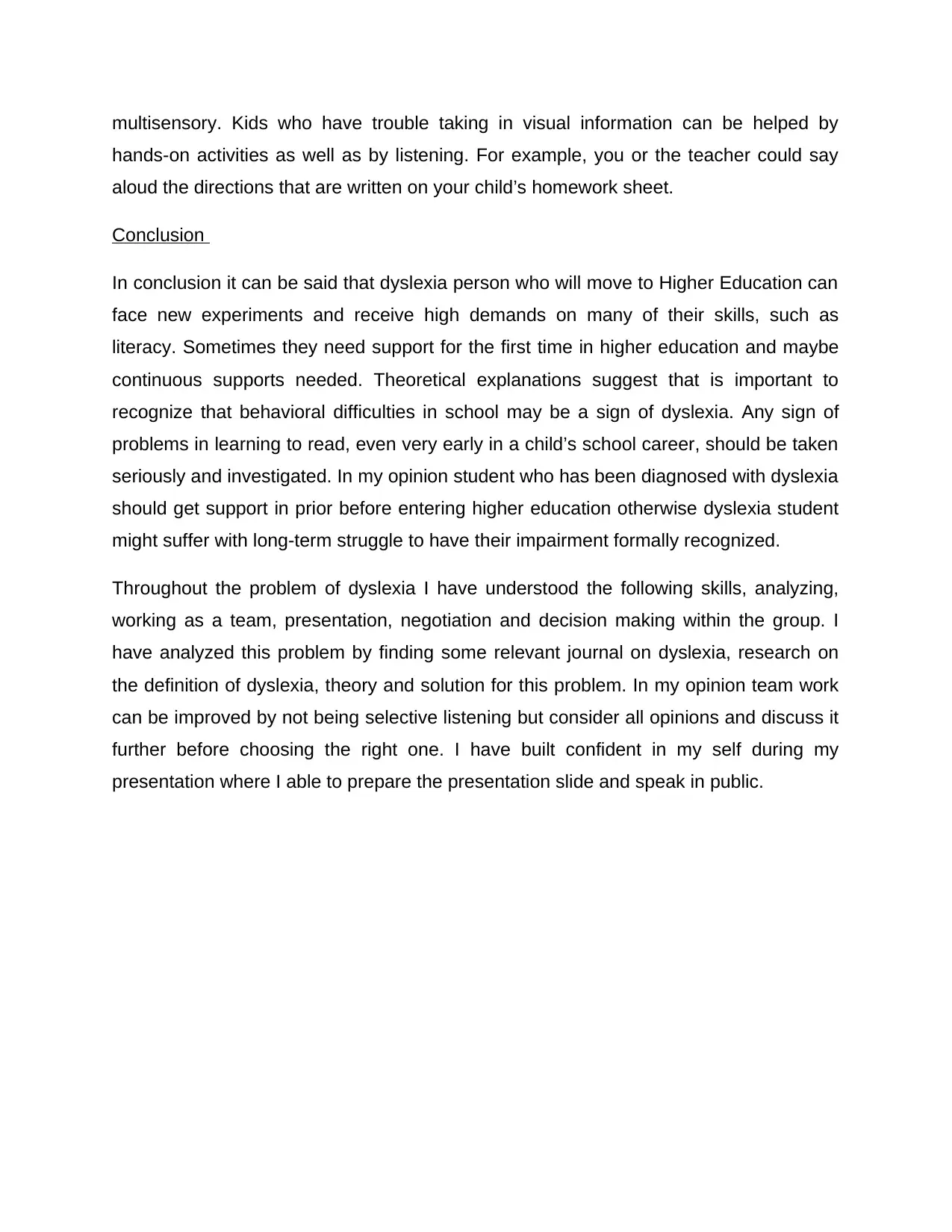
multisensory. Kids who have trouble taking in visual information can be helped by
hands-on activities as well as by listening. For example, you or the teacher could say
aloud the directions that are written on your child’s homework sheet.
Conclusion
In conclusion it can be said that dyslexia person who will move to Higher Education can
face new experiments and receive high demands on many of their skills, such as
literacy. Sometimes they need support for the first time in higher education and maybe
continuous supports needed. Theoretical explanations suggest that is important to
recognize that behavioral difficulties in school may be a sign of dyslexia. Any sign of
problems in learning to read, even very early in a child’s school career, should be taken
seriously and investigated. In my opinion student who has been diagnosed with dyslexia
should get support in prior before entering higher education otherwise dyslexia student
might suffer with long-term struggle to have their impairment formally recognized.
Throughout the problem of dyslexia I have understood the following skills, analyzing,
working as a team, presentation, negotiation and decision making within the group. I
have analyzed this problem by finding some relevant journal on dyslexia, research on
the definition of dyslexia, theory and solution for this problem. In my opinion team work
can be improved by not being selective listening but consider all opinions and discuss it
further before choosing the right one. I have built confident in my self during my
presentation where I able to prepare the presentation slide and speak in public.
hands-on activities as well as by listening. For example, you or the teacher could say
aloud the directions that are written on your child’s homework sheet.
Conclusion
In conclusion it can be said that dyslexia person who will move to Higher Education can
face new experiments and receive high demands on many of their skills, such as
literacy. Sometimes they need support for the first time in higher education and maybe
continuous supports needed. Theoretical explanations suggest that is important to
recognize that behavioral difficulties in school may be a sign of dyslexia. Any sign of
problems in learning to read, even very early in a child’s school career, should be taken
seriously and investigated. In my opinion student who has been diagnosed with dyslexia
should get support in prior before entering higher education otherwise dyslexia student
might suffer with long-term struggle to have their impairment formally recognized.
Throughout the problem of dyslexia I have understood the following skills, analyzing,
working as a team, presentation, negotiation and decision making within the group. I
have analyzed this problem by finding some relevant journal on dyslexia, research on
the definition of dyslexia, theory and solution for this problem. In my opinion team work
can be improved by not being selective listening but consider all opinions and discuss it
further before choosing the right one. I have built confident in my self during my
presentation where I able to prepare the presentation slide and speak in public.
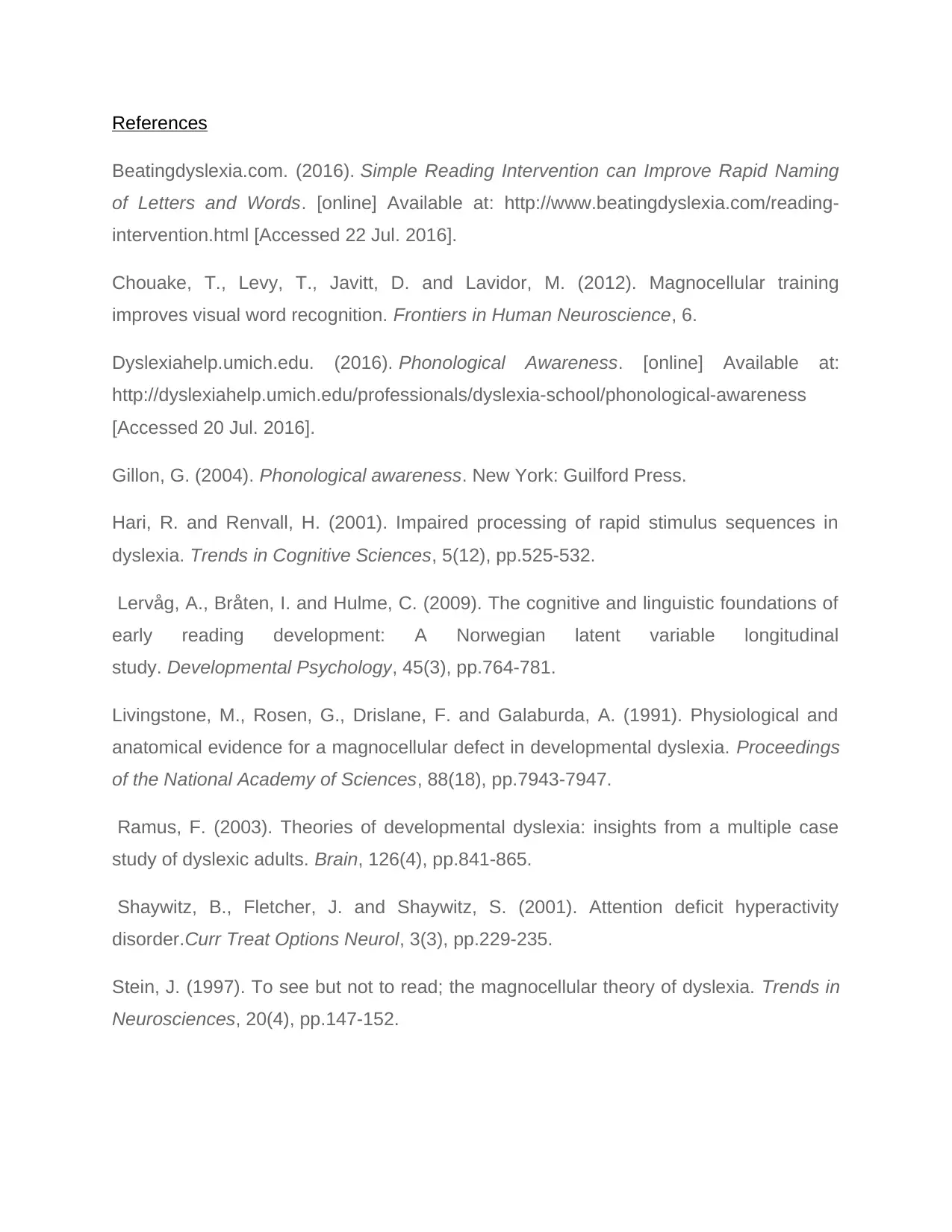
References
Beatingdyslexia.com. (2016). Simple Reading Intervention can Improve Rapid Naming
of Letters and Words. [online] Available at: http://www.beatingdyslexia.com/reading-
intervention.html [Accessed 22 Jul. 2016].
Chouake, T., Levy, T., Javitt, D. and Lavidor, M. (2012). Magnocellular training
improves visual word recognition. Frontiers in Human Neuroscience, 6.
Dyslexiahelp.umich.edu. (2016). Phonological Awareness. [online] Available at:
http://dyslexiahelp.umich.edu/professionals/dyslexia-school/phonological-awareness
[Accessed 20 Jul. 2016].
Gillon, G. (2004). Phonological awareness. New York: Guilford Press.
Hari, R. and Renvall, H. (2001). Impaired processing of rapid stimulus sequences in
dyslexia. Trends in Cognitive Sciences, 5(12), pp.525-532.
Lervåg, A., Bråten, I. and Hulme, C. (2009). The cognitive and linguistic foundations of
early reading development: A Norwegian latent variable longitudinal
study. Developmental Psychology, 45(3), pp.764-781.
Livingstone, M., Rosen, G., Drislane, F. and Galaburda, A. (1991). Physiological and
anatomical evidence for a magnocellular defect in developmental dyslexia. Proceedings
of the National Academy of Sciences, 88(18), pp.7943-7947.
Ramus, F. (2003). Theories of developmental dyslexia: insights from a multiple case
study of dyslexic adults. Brain, 126(4), pp.841-865.
Shaywitz, B., Fletcher, J. and Shaywitz, S. (2001). Attention deficit hyperactivity
disorder.Curr Treat Options Neurol, 3(3), pp.229-235.
Stein, J. (1997). To see but not to read; the magnocellular theory of dyslexia. Trends in
Neurosciences, 20(4), pp.147-152.
Beatingdyslexia.com. (2016). Simple Reading Intervention can Improve Rapid Naming
of Letters and Words. [online] Available at: http://www.beatingdyslexia.com/reading-
intervention.html [Accessed 22 Jul. 2016].
Chouake, T., Levy, T., Javitt, D. and Lavidor, M. (2012). Magnocellular training
improves visual word recognition. Frontiers in Human Neuroscience, 6.
Dyslexiahelp.umich.edu. (2016). Phonological Awareness. [online] Available at:
http://dyslexiahelp.umich.edu/professionals/dyslexia-school/phonological-awareness
[Accessed 20 Jul. 2016].
Gillon, G. (2004). Phonological awareness. New York: Guilford Press.
Hari, R. and Renvall, H. (2001). Impaired processing of rapid stimulus sequences in
dyslexia. Trends in Cognitive Sciences, 5(12), pp.525-532.
Lervåg, A., Bråten, I. and Hulme, C. (2009). The cognitive and linguistic foundations of
early reading development: A Norwegian latent variable longitudinal
study. Developmental Psychology, 45(3), pp.764-781.
Livingstone, M., Rosen, G., Drislane, F. and Galaburda, A. (1991). Physiological and
anatomical evidence for a magnocellular defect in developmental dyslexia. Proceedings
of the National Academy of Sciences, 88(18), pp.7943-7947.
Ramus, F. (2003). Theories of developmental dyslexia: insights from a multiple case
study of dyslexic adults. Brain, 126(4), pp.841-865.
Shaywitz, B., Fletcher, J. and Shaywitz, S. (2001). Attention deficit hyperactivity
disorder.Curr Treat Options Neurol, 3(3), pp.229-235.
Stein, J. (1997). To see but not to read; the magnocellular theory of dyslexia. Trends in
Neurosciences, 20(4), pp.147-152.
⊘ This is a preview!⊘
Do you want full access?
Subscribe today to unlock all pages.

Trusted by 1+ million students worldwide
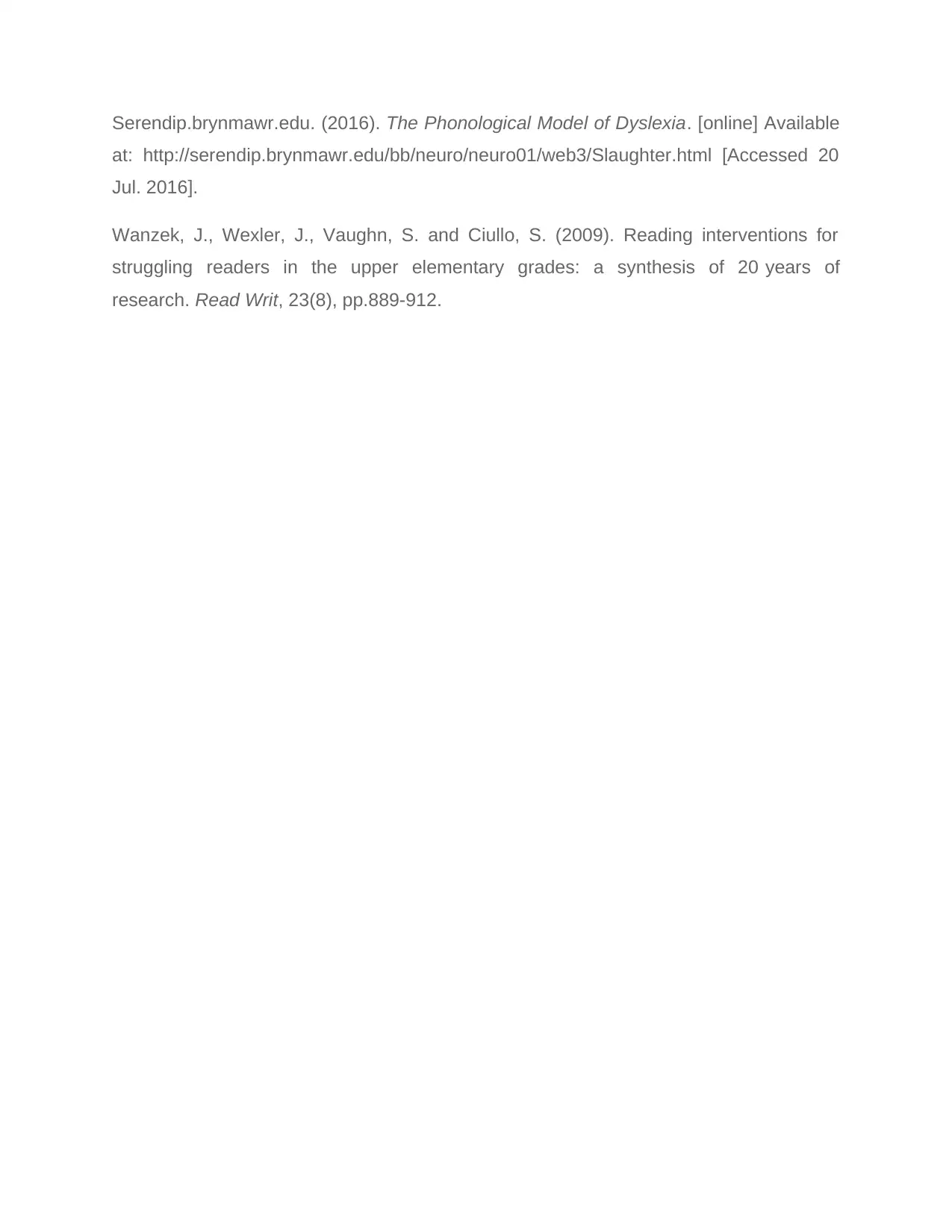
Serendip.brynmawr.edu. (2016). The Phonological Model of Dyslexia. [online] Available
at: http://serendip.brynmawr.edu/bb/neuro/neuro01/web3/Slaughter.html [Accessed 20
Jul. 2016].
Wanzek, J., Wexler, J., Vaughn, S. and Ciullo, S. (2009). Reading interventions for
struggling readers in the upper elementary grades: a synthesis of 20 years of
research. Read Writ, 23(8), pp.889-912.
at: http://serendip.brynmawr.edu/bb/neuro/neuro01/web3/Slaughter.html [Accessed 20
Jul. 2016].
Wanzek, J., Wexler, J., Vaughn, S. and Ciullo, S. (2009). Reading interventions for
struggling readers in the upper elementary grades: a synthesis of 20 years of
research. Read Writ, 23(8), pp.889-912.
1 out of 7
Related Documents
Your All-in-One AI-Powered Toolkit for Academic Success.
+13062052269
info@desklib.com
Available 24*7 on WhatsApp / Email
![[object Object]](/_next/static/media/star-bottom.7253800d.svg)
Unlock your academic potential
Copyright © 2020–2025 A2Z Services. All Rights Reserved. Developed and managed by ZUCOL.





